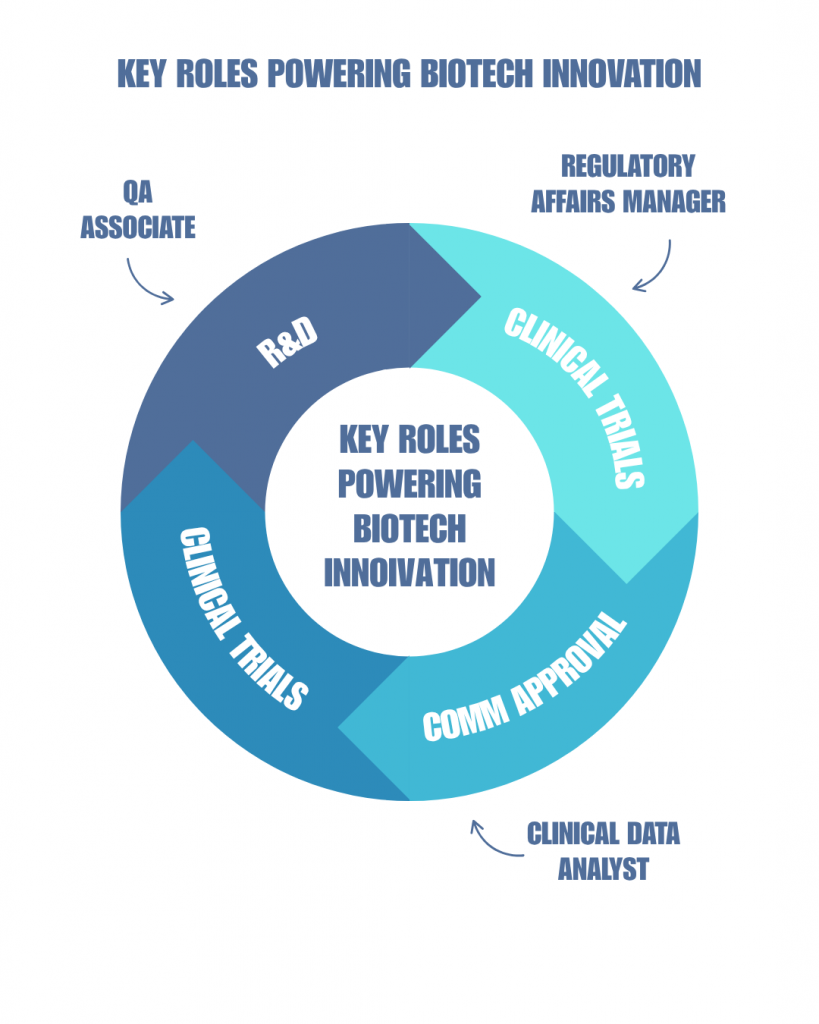Innovation is the heartbeat of the biotech industry. From AI-driven drug discovery to personalised medicine and advanced biologics, science is moving fast and hiring needs to keep pace. For biotech firms, success depends not just on scientific breakthroughs but also on recruiting the right people to drive them.
In this blog, we explore how recruitment strategies must evolve to support innovation, the emerging roles in demand, and how agencies like PE Global help biotech companies build agile, future-ready teams.
Biotech roles increasingly blur the lines between science, tech, and business, requiring candidates with hybrid skill sets.
The Innovation Boom in Biotech: What’s Driving It?
Biotech is booming. Global R&D pipelines are expanding, with growth driven by:
- Precision Medicine: Using patient-specific genetic information to tailor treatments
- Synthetic Biology: Engineering biological systems for pharmaceuticals and diagnostics
- AI & Data Science: Automating drug discovery and trial optimisation
- Advanced Therapies: Cell and gene therapies, RNA-based platforms (e.g., mRNA)
- Sustainability: Green chemistry, low-impact manufacturing, and circular pharma
This innovation wave is creating entirely new types of roles, requiring a blend of scientific knowledge, regulatory awareness, and digital literacy.
Key Biotech Roles Shaping the Future
Let’s explore some of the most sought-after roles and what each contributes to the biotech value chain.

1. QA Associate (Quality Assurance Associate)
What they do:
QA Associates are responsible for ensuring that biotech products meet regulatory quality standards (e.g. GMP, GLP, ISO 13485). They manage documentation, audits, deviations, and CAPA processes.
Skills needed:
- Understanding of regulatory frameworks (FDA, EMA, HPRA)
- Risk-based quality management
- Strong documentation and SOP writing
- Cross-functional communication
Why they matter:
In a fast-moving sector, QA professionals ensure innovation doesn’t come at the cost of compliance.
2. Regulatory Affairs Manager
What they do:
Regulatory Managers develop and execute strategies to gain product approvals from health authorities. They coordinate submissions, advise on clinical trial protocols, and interpret regulatory changes globally.
Skills needed:
- Regulatory intelligence
- Clinical trial experience
- Market-specific knowledge (e.g. EU MDR, US FDA pathways)
- Interpersonal skills to liaise with R&D, clinical, and legal teams
Why they matter:
They act as gatekeepers, helping companies innovate while navigating complex, evolving regulations.
3. Clinical Data Analyst
What they do:
They collect, manage, and interpret data from clinical trials. These analysts ensure data integrity, perform statistical analyses, and support decision-making in clinical development.
Skills needed:
- Clinical data management systems (e.g. Medidata, Oracle Clinical)
- Programming/statistics (SAS, R)
- Knowledge of ICH-GCP, CDISC standards
- Analytical mindset
Why they matter:
As trials become more digital and decentralised, data analysts are essential to accelerating timelines and improving patient outcomes.
What Makes Biotech Recruitment Different?
Unlike broader life sciences or healthcare sectors, biotech recruitment is:
- Highly specialised: Candidates often need experience in a specific therapeutic area, platform (e.g., monoclonal antibodies), or stage (pre-clinical vs post-market).
- Regulatory-bound: Candidates must be comfortable working in regulated environments, often across multiple jurisdictions.
- Cross-functional: Roles increasingly blur the lines between science, tech, and business, requiring candidates with hybrid skill sets.
- Fast-paced: Startups and scale-ups need talent that can wear multiple hats and adapt quickly.
How Recruitment Partners Can Drive Innovation
As a recruitment agency at the forefront of biotech hiring, PE Global adds value by:
- Tapping into specialist networks of talent across the UK, Ireland, the EU, and beyond
- Screening candidates not just for technical fit, but also for innovation potential
- Supporting relocation and global mobility for hard-to-fill niche roles
- Advising on EVP (Employee Value Proposition) to help clients stay competitive in a candidate-driven market
- Building scalable contract and permanent hiring models for fast-moving biotech environments
Conclusion: The Right People Drive Progress
Biotech companies that want to innovate must prioritise talent acquisition. Hiring the right scientists, those who understand the science and the systems that support it, is the foundation for breakthrough discoveries.
Whether you’re a startup seeking speed or a multinational scaling global trials, having a recruitment partner who understands biotech is essential.
At PE Global, our experience, networks, and industry insight mean we’re not just filling jobs, we’re building the future of life sciences.
Whether you’re seeking new opportunities or looking to hire skilled professionals, our expertise ensures the perfect match. View our latest Life Sciences roles or get in touch with the team today at queries@peglobal.net.
